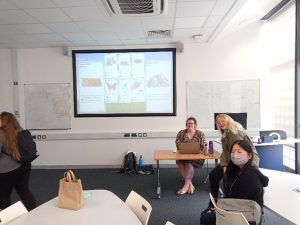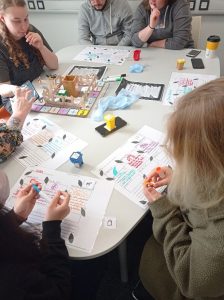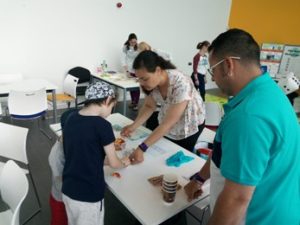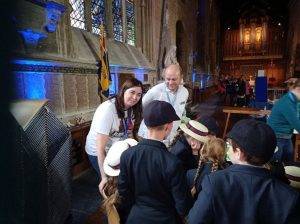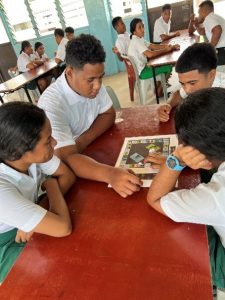| College | College of Science |
| School / Department (list all where collaborative across more than one) | Department of Geography |
| Project / Innovation Title | Enhancing Education for Sustainable Development at HE, Primary and Secondary School Levels: The development of experiential educational game design and play with HE students |
| Start & End Dates (where applicable) | January 2020 – present |
| Project Lead Name | Theresa Mercer |
| Additional Project Team Members | Andrew Kythreotis |
The need for quality education around climate change and sustainability for all levels of learning has been increasingly called for (Monroe et al., 2019). It is widely accepted that young people often struggle to have a clear understanding of what climate change is (Gago & Sa, 2021), what the impacts are and what sustainable action can be taken to enable them to act and make a difference (Kythreotis and Mercer, 2020). Formal education is an essential avenue for ensuring that scientifically informed and evidence-based understandings of climate change and sustainability are available to young people. Universities can play an important role in participating with and improving climate change education (CCE) and education for sustainable development (ESD). For example, the Alliance for Sustainability Leadership in Education (EAUC), which is made up of 7,000 universities, have committed to providing more resources and increasing community outreach programmes around CCE (EAUC, 2019; Kythreotis et al., 2019).
The rationale of this project was to help develop environmentally literate students become graduates who embody the spirit of sustainable societies for the future. The study develops a new innovative experiential life-cycle approach to ESD whereby HE geography students become co-producers of climate knowledge and action through creating, playing and delivering games to primary and secondary school pupils. These games are related to sustainable lifestyle choices and climate change impacts. In essence, the students become the teachers. This approach was also taken to help support teacher capacity and knowledge on sustainability and climate change issues.
This type of innovative and non-traditional assessment type that addresses real world problems (in this case the need to promote pro-environmental behaviours) is increasingly being called for by both students and academics (QAA & Advance HE, 2021; Price et al., 2020). As a result of this particular assessment, students have gone on to produce amazingly creative in-person games that have been used for outreach activity. They have reported an increase in a variety of skill sets and knowledge. Where these games have been played with school pupils, and students have been involved in co-produced research, there have been positive impacts to the pro-environmental behaviours and knowledge reported by school pupils and their teachers (see next section on impact).
Over the last few years, this approach has been adopted on a 3rd year Environmental Management course at the University of Lincoln. The last two years have seen hurdles that have had to be overcome, particularly with the move to remote learning as a result of the COVID-19 lockdown restrictions (Mercer et al., forthcoming). However, even though many of the students do not have experience in computer programming or coding, they came up with innovative ways to deliver games online including ‘dungeon master’ type games that can be delivered where the game is facilitated by a game leader remotely or creating board games in Excel and sharing the file for simultaneous playing through the Cloud where game players can move their pieces around in real time. The remote games now complement the more hands-on interactive games that students in previous cohorts have developed, thereby contributing to a future-proofed game repository for school outreach activity.
The assessment that is linked to this approach involved working in groups (remotely during lockdown restrictions) to design and produce their games with summative assessment in the form of a report that included full activity plans for their games. Over the last two years, students have been delivering student-produced games and using the activity plans to deliver both in person and remotely to local and regional schools, most notably at the 2021 Lincolnshire Climate Summit that coincided with COP26.
We found several benefits of using the game design approach that links to the overall student experience, the learning experience and outcomes for students. Positive impacts are also felt beyond the university and into the local community, for example, in increasing the capacity of teachers in local schools (primary and secondary level) to teach about climate change and sustainability, exposing school pupils to university life and building stronger community links between educational institutions. School pupils and teachers also commented on the accessibility of the material in helping pupils understand these complex and value-laden topics. Beyond schools there is also the ’knock-on’ effect of intergenerational learning through school children passing on the messages of pro-environmental behaviour, sustainability and climate change to their families and wider communities (Kythreotis & Mercer, 2020; Mercer et al., 2019; Mercer & Kythreotis, 2020).
We have now developed and co-created several resources (those with asterisks have been co-created with students) to help other academics to adopt this approach including:
- A journal case study in the International Journal of Sustainability in Higher Education
-
- Mercer, T.G., Kythreotis, A.P., Stolte, T., Robinson, Z., George, S.M., Haywood, S.K. (2017). The Use of Educational Game Design and Play in Higher Education to Influence Sustainable Behaviour. International Journal of Sustainability in Higher Education, 18 (3), pp. 359-384.;
- A Times Higher Education resource piece:
- Mercer, T.G., Kythreotis, AP, Robinson, Z, George, S and Sands, D (2019). Step out of your comfort zone, try discipline-based educational research. Times Higher Education, Sept 22nd, 2019.
- Book chapters:
- * Mercer, T.G., Kythreotis, A.P. Kelly, H., Robinson, Z.P., George, S.M. & Sands, D. (forthcoming). Future-proofing geography teaching and learning using remote learning and co-creation approaches. In: Garcia de la Vega, A. et al (Eds). Didactic Strategies and Resources for Innovative Geography Teaching.
- Kythreotis A.P. & Mercer T.G. (2020). Collaborative Education as a ‘New (Urban) Civil Politics of Climate Change’. In: Castán Broto V., Robin E., While A. (eds) Climate Urbanism. Palgrave Macmillan, Cham.
- Mercer, T.G.& Kythreotis, A.P. (2020). Towards Citizen Governance for Climate Change Education and Justice: A Science–Policy Perspective. In: Myers, S., Hemstock, S. and Hanna, E. (Eds.) Science, Faith and the Climate Crisis, Emerald Publishing Limited, pp. 79-92.
- Student-produced journal article:
- Student undergraduate dissertations
- * Feistner, E. (2022). Evaluating the effectiveness of Game Based Learning as a tool to aid Education for Sustainable Development and promote the uptake of sustainable behaviours in Key Stage 2 children. BSc. University of Lincoln.
- * Mashiter, E. (2022). The Role of Remotely Delivered Educational Games in the Context of Education for Sustainable Development in Secondary Schools. BA. University of Lincoln.
| Please indicate which category/categories this project/activity aligns with | |
| Academic Experience | |
| Employability | |
| Learning Environment | |
| Learning Gain | |
| Student Engagement/ Student as Producer | ü |
| Other (please indicate) | |
